Unlocking the Debate: Are Self-Defense Keychains Legal or Not?
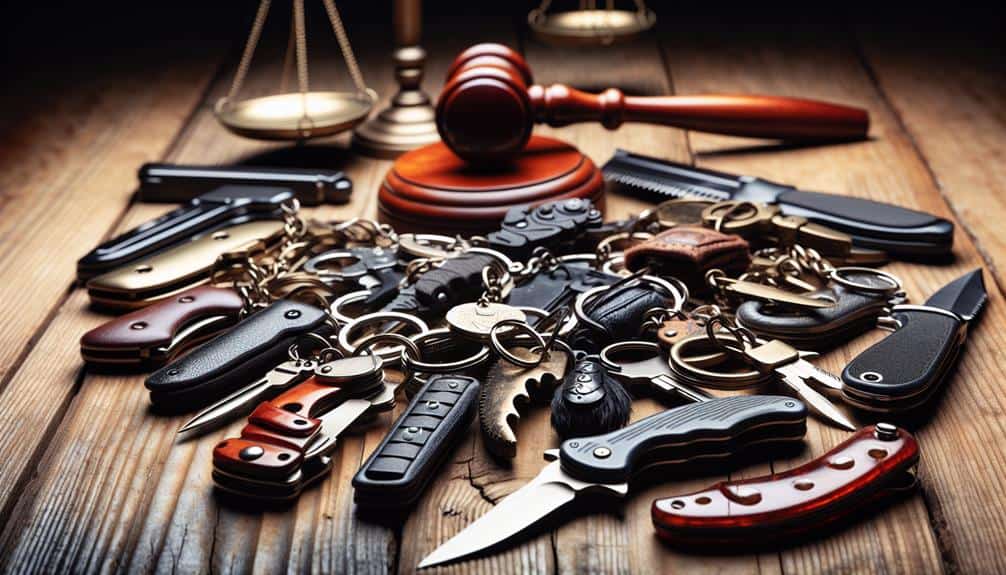
Understanding the legality of self-defense keychains can be tricky, as it wildly varies based on design and location. Imagine whipping out a brass knuckle keychain in Florida—a potential legal gray area that could land you in hot water. Cat Strike keychains, however, are a safe bet, being legal and effective in all states. States like California have strict rules, while Texas is more lenient. To stay on the safe side, research local laws and avoid weapon-like designs. Trust me, you don’t want a minor keychain choice turning into a legal headache—there’s much more to discover about these tiny, powerful tools!
Understanding Self-Defense Keychains
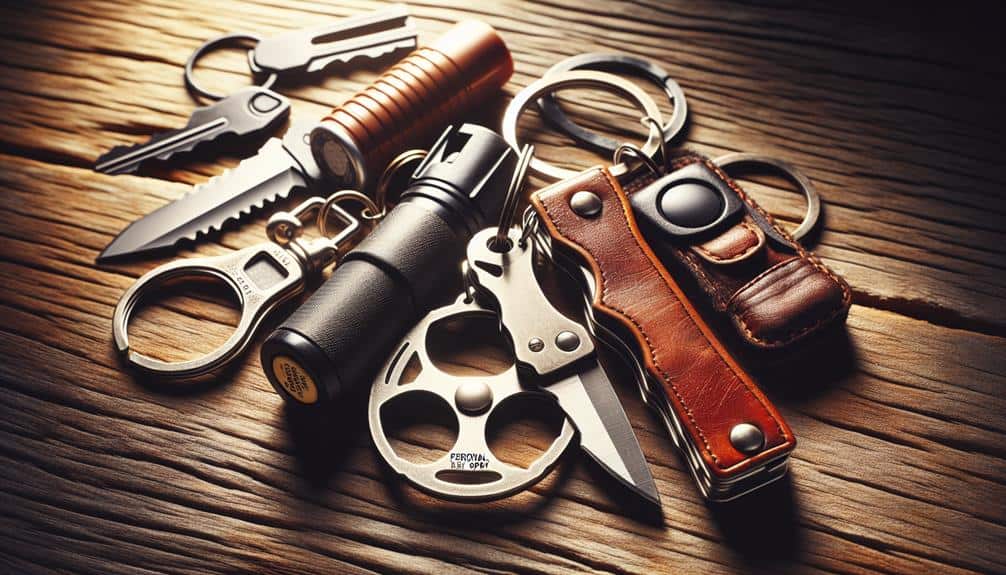
When it comes to self-defense keychains, understanding their design and purpose is essential for selecting the right one for your needs. These handy tools aren’t just decorative; they’re practical devices meant to help you protect yourself. You’ll find them in various designs like Kubotans, kitty cat shapes, and even brass knuckles.
While these options offer discrete and portable means of self-defense, it’s important to take into account their legality. For instance, brass knuckles, often integrated into self-defense keychains, can pose legal issues. Depending on where you live, carrying them could land you in hot water. It’s always wise to research if self-defense keychains are legal in your state before making a purchase.
Brutus keychains are an excellent example of a legal, effective option. They’re designed to be non-threatening in appearance but pack a punch when needed. They’re legal in all states, offering peace of mind along with protection.
Legal Framework in Florida
When you think about self-defense options in Florida, you might picture handguns, tasers, or even pepper spray, but what about self-defense keychains?
Florida’s weapon regulations cover a wide range of tools, yet the legal status of keychains designed for self-defense can be a bit murky.
We’ll break down how these everyday items fit into the state’s legal framework, so you can stay safe and compliant—because nobody wants their keychain to land them in hot water!
Florida Weapon Regulations
Florida’s weapon regulations permit a range of self-defense tools, including handguns, Tasers, stun guns, and pepper spray. The Sunshine State has a pretty all-encompassing approach when it comes to personal safety. If you’re wondering whether self-defense keychains are legal in Florida, it’s important to understand the broader context of what’s allowed.
Handguns are legal and widely used for protection. You might be surprised to know that AR and AK pistols fall under this category. On the less lethal side, you’ve got Tasers and stun guns, which can incapacitate an attacker without causing permanent harm. Pepper spray is also a popular choice, giving you a non-lethal way to fend off would-be attackers.
The state’s laws don’t explicitly mention self-defense keychains, but given the allowance of various self-defense tools, it’s a fair assumption they’re viewed favorably. Just make sure your keychain doesn’t morph into brass knuckles, which aren’t clearly addressed in Florida’s regulations.
Interestingly, while you can arm yourself with a range of tools, machine guns are strictly off-limits. So, when it comes to self-defense in Florida, you’re well-covered with a mix of options, but always stay updated on specific legal nuances.
Keychain Legal Restrictions
Exploring the legal landscape of self-defense keychains in Florida can be challenging due to their ambiguous classification. While handguns, knives, and electronic weapons are explicitly allowed for self-defense, the law doesn’t clearly address self-defense keychains. Brass knuckles, which some keychains resemble, aren’t specified as legal or illegal, adding to the confusion.
Machine guns, of course, are entirely prohibited, but where does that leave your handy little keychain?
Understanding Florida’s specific weapon laws is important. Since self-defense keychains fall into a gray area, it’s vital to stay informed:
- Consult Local Law Enforcement: Before carrying a self-defense keychain, ask your local police department for guidance.
- Stay Updated: Keep an eye on any changes in state legislation that might clarify the legality of self-defense keychains.
- Understand Intent: If questioned, your intent for carrying the keychain (self-defense) might impact its legality.
- Be Prepared: Knowledge of other permissible self-defense tools can offer alternatives.
- Seek Legal Advice: Consult an attorney specializing in Florida weapon laws for personalized advice.
Navigating these murky waters requires diligence. Remember, while a keychain can’t replace a machine gun (thankfully!), it’s always wise to know the ins and outs of your self-defense options.
Comparison With Other Self-Defense Tools
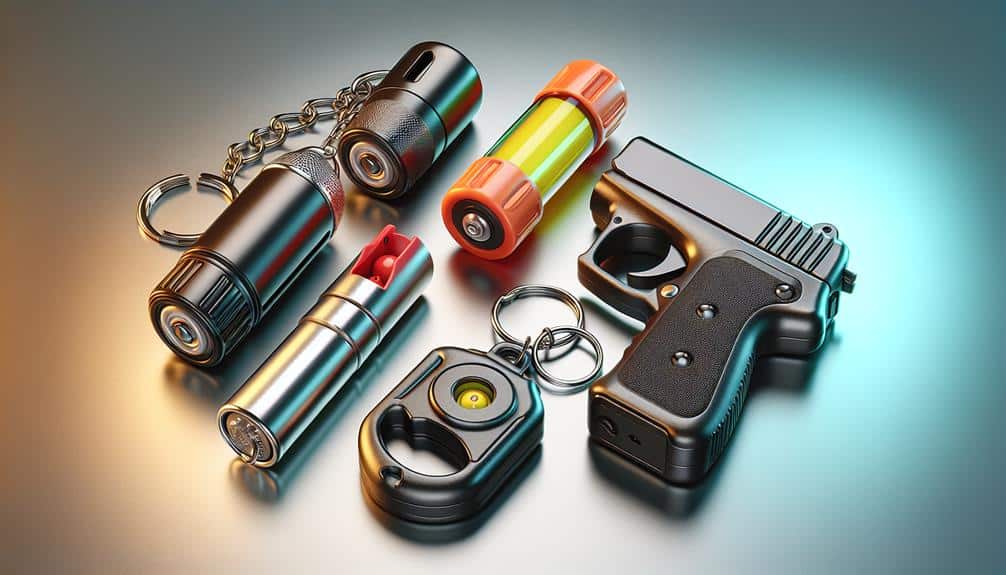
When comparing self-defense keychains to other self-defense tools, you’ll find each option has its own set of advantages and legal considerations.
Pepper spray, while effective, can be restricted in some states and might blow back into your face on a windy day, whereas tactical pens offer a dual-purpose tool but require close proximity to be effective.
Stun guns, on the other hand, pack a punch but often come with stringent regulations, making self-defense keychains a versatile and accessible choice for everyday protection.
Pepper Spray Legality
Pepper spray, unlike some other self-defense tools, is legal in all 50 states, though certain states impose restrictions on its size and concentration. It’s a popular choice for self-defense because it’s non-lethal, effective, and easy to use. However, pepper spray legality varies, and it’s important to know the specifics in your state to avoid running afoul of legal restrictions.
When comparing pepper spray to self-defense keychains, you’ll find that pepper spray offers several unique advantages:
- Widespread Legality: Pepper spray is universally accepted across the U.S., unlike some self-defense keychains, which may face stricter scrutiny.
- Non-Lethal: It provides a powerful deterrent without the risk of fatal harm, making it a safer option for both the user and the attacker.
- Ease of Use: A quick spray can disable an attacker, giving you precious seconds to escape.
- Portability: Available in compact sizes, it can fit easily in a purse or pocket, making it an ideal everyday carry item.
- Variety: You can find pepper spray in various forms, from keychain models to larger canisters, catering to different needs and preferences.
Understanding pepper spray legality and its advantages can help you make an informed choice in your self-defense strategy.
Tactical Pens Comparison
Tactical pens stand out among self-defense tools due to their discreet design and multifunctional capabilities, making them a versatile option for personal protection. Imagine you’re in a sticky situation; having a tactical pen, which resembles a regular writing pen, gives you an edge without drawing unwanted attention. This inconspicuous design is perfect for blending in while providing a reliable means of defense.
When you compare tactical pen features to other self-defense tools, their durability is a significant advantage. Made from robust materials like aluminum or steel, these pens can withstand substantial impact and pressure. Think of it as carrying a mini fort in your pocket! Plus, many tactical pens come with bonus features like LED flashlights, glass breakers, and even DNA collectors, adding layers of utility in emergencies.
In a durability comparison with tools like pepper spray or stun guns, tactical pens often come out on top due to their sturdy construction. While pepper spray might run out and stun guns rely on batteries, a tactical pen’s simplicity ensures it’s ready when you need it.
Stun Guns Regulations
Understanding the regulations surrounding stun guns can be confusing, especially when compared to other self-defense tools. Stun guns are popular for personal safety due to their portability and ease of use, but they come with specific stun gun restrictions that vary widely by state.
Unlike keychains, which often escape heavy scrutiny under self defense laws, stun guns deliver an electric shock to incapacitate an attacker temporarily, making them a bit more controversial.
When comparing stun guns to other self-defense tools, grasping the nuances in legal requirements is crucial:
- Stun guns: Some states require legal permits or licenses for weapon possession, while others have outright bans.
- Pepper spray: Generally more lenient regulations, with fewer states requiring permits.
- Tactical pens: Often seen as benign, these typically dodge most legal scrutiny.
- Self-defense keychains: Keychain legality varies but usually faces fewer restrictions than stun guns.
- Firearms: Highly regulated, requiring permits, background checks, and strict adherence to state and federal laws.
Navigating these self defense laws can feel like a maze. You might need a permit to carry a stun gun in one state, while in another, you could face hefty fines for even owning one.
State-by-State Regulations
Understanding the varying state-by-state regulations on self-defense keychains is essential to ensure you’re complying with the law. Different states have state-specific guidelines regarding keychain legality, and it’s your responsibility to know them.
Some states view these self-defense tools as perfectly acceptable personal protection devices, while others might classify them as illegal weapons. For instance, California has strict regulations on certain keychains, like brass knuckles, which could land you in hot water if you’re not careful. On the flip side, states like Texas are more lenient, allowing a broader range of self-defense keychains.
Navigating these legal restrictions can feel like you’re playing a game of ‘legal whack-a-mole.’ To avoid any unpleasant surprises, consult local law enforcement or legal resources to get a clear understanding of keychain regulations in your state.
After all, nobody wants their self-defense tool to become a ticket to unexpected legal trouble. Staying informed about state-by-state regulations helps you make educated decisions about carrying a self-defense keychain. So, do your homework, and make sure your personal protection doesn’t come with a side of legal complications.
And remember, knowledge is your first line of defense!
Choosing the Right Keychain
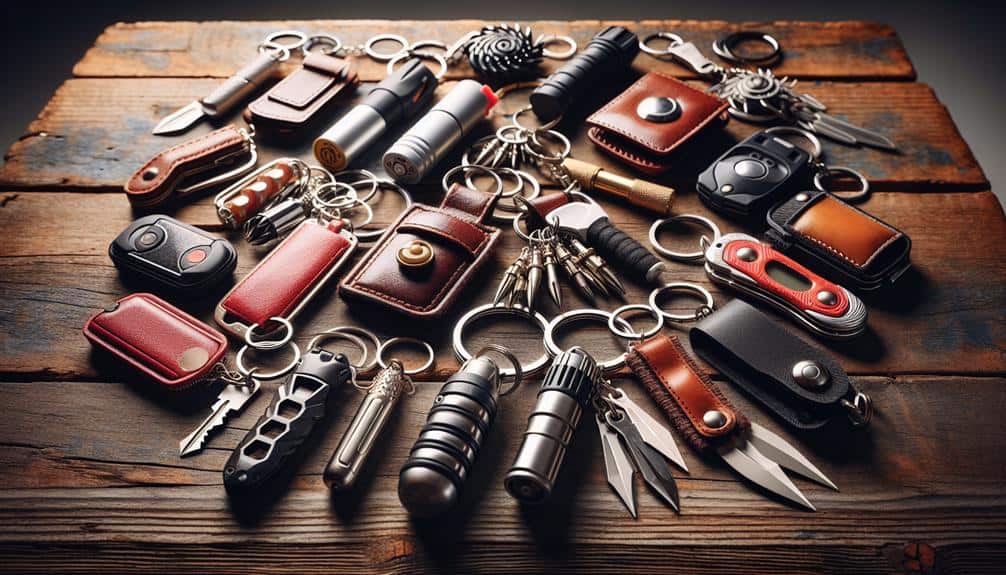
When selecting the right self-defense keychain, prioritize one that doesn’t resemble a weapon to avoid legal complications. The last thing you want is for your keychain to draw unwanted attention or be mistaken for a prohibited item, especially in a tense situation.
Consider these factors:
- Keychain materials, durability: Opt for high-quality materials like stainless steel or reinforced plastic to guarantee it won’t break when you need it most.
- Design, aesthetics: Pick a design that looks innocent and blends in with your everyday items, like a cat-shaped keychain or a whistle, rather than something that screams ‘weapon.’
- Accessibility, portability: Make sure it’s easy to carry and access quickly. After all, it’s no good if you can’t reach it in time.
- Functionality: Choose a keychain that serves multiple purposes—maybe it doubles as a flashlight or a bottle opener—making it more practical and less suspicious.
- Comfort: Ensure it feels comfortable in your hand. If it’s awkward to handle, you might struggle to use it effectively.
Legal Consequences and Risks
Understanding the legal landscape of self-defense keychains is vital to avoid fines or criminal charges. You need to be aware that carrying an illegal self-defense keychain can lead to serious legal liabilities.
Imagine being in a sticky situation and reaching for your trusty keychain, only to find yourself facing hefty fines or even criminal charges because your state deems it illegal. Not fun, right?
Risk management is essential here. Different states have varying laws regarding these keychains, so you’ve got to do your homework. Check local regulations to make sure your self-defense tool doesn’t land you in hot water.
Law enforcement may confiscate your keychain if it’s deemed illegal, leading to the loss of your item and potentially more severe legal trouble. Imagine explaining that to your friends over coffee!
Consequences evaluation is another key aspect. Using a self-defense keychain in a way that’s perceived as excessive force can result in lawsuits. Nobody wants to defend themselves only to end up in court. Knowing the legal implications can help you make informed decisions, protecting yourself within the bounds of the law.
Self-Defense Keychain Alternatives
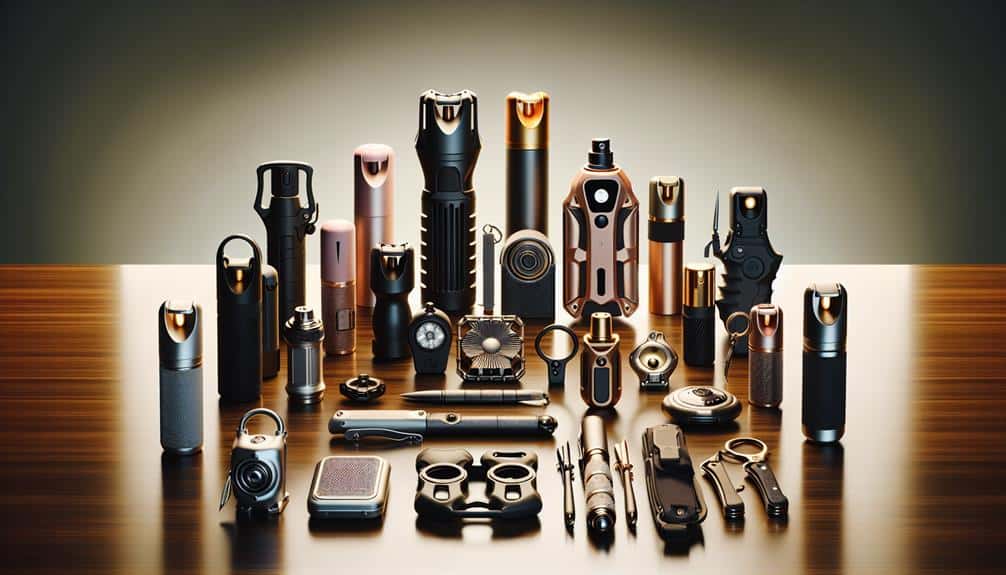
- Pepper Spray Alternatives: A classic choice, pepper spray can incapacitate an attacker temporarily, giving you precious moments to escape and find help. It’s compact, easy to use, and widely legal.
- Personal Alarms Effectiveness: These little gadgets are surprisingly loud! A personal alarm can attract attention and potentially deter an attacker. The blaring noise can cause panic and confusion, buying you time to get away.
- Tactical Flashlights Benefits: These aren’t just for finding your keys at night. A tactical flashlight can blind and disorient an aggressor with its high-intensity beam. Plus, it’s handy in your daily life!
- Tactical Pens: Yes, a pen! These sturdy writing instruments can double as a self-defense tool. They’re inconspicuous and can be used to jab or strike if necessary.
- Stun Guns: A bit more intense, but effective. Stun guns deliver a high-voltage shock to an attacker, immobilizing them briefly. Most are small enough to carry in a purse or pocket.
Each of these alternatives offers unique benefits, helping you stay safe and sound without the potential legal complications of self-defense keychains.
Expert Opinions and Advice
Experts recommend checking with local law enforcement or legal advisors to confirm that your self-defense keychain complies with regional laws. Legal considerations can vary widely, and what’s perfectly legal in one state might be a no-go in another. Expert opinions stress the importance of understanding these nuances to avoid unintended legal consequences.
To make your decision easier, here’s a table summarizing key points:
| Category | Keychain Recommendations | Legal Considerations |
|---|---|---|
| Expert Opinions | Opt for inconspicuous designs | Check state-specific laws |
| Self Defense Effectiveness | Choose sturdy materials, easy to use | Ensure it’s not classified as a weapon |
| Keychain Design | Compact, ergonomic, non-threatening | Avoid features that resemble brass knuckles |
When evaluating keychain design, functionality analysis is essential. A sleek, ergonomic design not only ensures effectiveness in self-defense situations but also helps in staying within legal boundaries. For instance, a colorful, cat-shaped keychain might look innocent yet pack enough punch when needed.
Experts also advise against overly aggressive designs that may be perceived as weapons, like those resembling brass knuckles. Stick to keychains that balance self-defense effectiveness with a non-threatening appearance, ensuring you stay safe and legal. Remember, the best keychain is one that protects you without attracting unwanted legal attention.
Staying Informed

Staying updated on the most recent legal requirements for self-defense keychains is important to guarantee you’re always in compliance. As laws can change frequently, it’s vital to stay on top of current updates to avoid any legal implications.
Here’s a handy list to help you stay informed and within compliance guidelines:
- Consult Local Law Enforcement: Check with your local police department or legal advisor to get the lowdown on whether self-defense keychains are legal in your area.
- Review State Criminal Codes: Take a peek at your state’s criminal codes and statutes that mention defensive keychains. It might sound tedious, but it’s better than an unexpected run-in with the law!
- Research Restrictions: Some places have restrictions on carrying self-defense keychains. For example, schools, government buildings, or even certain states might’ve specific rules.
- Monitor Legal Resources and News: Keep an eye on legal resources and news outlets for any changes or amendments to existing laws. Ignorance of the law is no excuse!
- Understand Legal Implications: Be proactive in understanding the legal implications of carrying self-defense keychains. It can save you from potential legal headaches.
Staying informed isn’t just smart—it’s necessary. Trust me, you don’t want your self-defense tool turning into a legal liability!
Frequently Asked Questions
Are Self-Defence Keychains Legal?
You’ll find that self-defense keychains’ legality varies due to jurisdiction differences and enforcement complexities. Always check local laws, as legal variations mean some places might restrict them while others permit their use.
Are Stabby Cat Keychains Illegal?
You should check with local law enforcement about stabby cat keychains. While they’re great for personal safety, legal restrictions in some areas classify them as offensive weapons. Knowing your state laws can help you avoid legal trouble.
Can I Use My Keys as Self-Defense?
You can use your keys for personal safety in emergency situations. However, be aware of the legal implications. It’s important to stay informed about local laws to make sure your self-defense actions remain within legal boundaries.
Can You Sell Self-Defense Keychains?
Yes, you can sell self-defense keychains, but you must adhere to retail regulations, follow manufacturer guidelines, and comply with rules of online marketplaces. Always verify local laws to make sure your products meet all legal requirements.


https://dissertation-now.com/tutoriage-com/